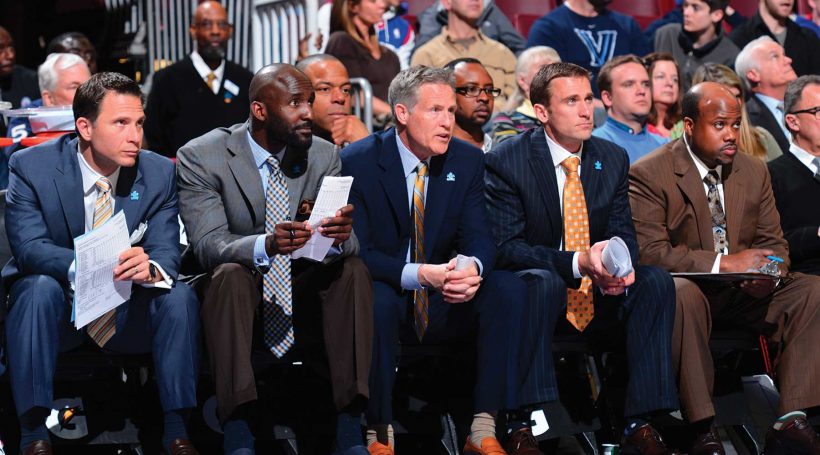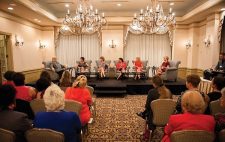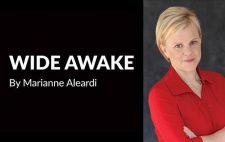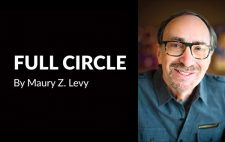Billy Lange is a lifelong Philadelphia 76ers fan. He was, after all, raised in Haddon Heights and educated at Bishop Eustace Preparatory School and Rowan University. The son of a high school basketball coach, Lange knew early on his dream was to lead from the sidelines. After coaching stints at local high schools and colleges, plus a record-setting run at the United States Naval Academy, Lange, 43, hit the big leagues two seasons ago when he accepted an assistant coaching position with the Sixers.
The Sixers are the youngest team in the NBA, with just two players over the age of 30. This team is doing something very different – can you explain the “rebuilding” mentality?
We are in total rebuild mode. That means bringing on the young players who are going to blossom into experienced, unbeatable veterans. This has never happened before in any professional sport, where a team has been torn down to the ground and rebuilt.
When I came onboard, these wheels were already turning. We have a general manager and an ownership that is charting a course for this organization well into the future. The decision for me was, “Do I want to be a part of this?” and I did. None of this philosophy is born out of emotion or irrational thinking. Everything has been studied and calculated, and this really is our best chance to be good for a long time.
It takes great courage to do anything different, but nothing great has ever come out of fear. These young players are breathing life into the program and working hard. We’re not thinking about timelines. When it’s ready to happen, it’ll happen.
The Sixers have won only 37 games in the past two seasons, but this year they’re facing what some call a very weak Eastern Conference – do you have a prediction about their chances?
There’s hope. We all have hope that things will be better than they are or have been. Are we ready to make the playoffs right now? That’s hard to envision, but I can tell you there’s not a person in the organization who isn’t trying their best to do just that. I don’t think I can tell you what the odds are. Here’s what I know: we’ll show up every day and play hard, and something is just going to have to fall our way. I wish I could tell you when it’s going to be that we’re running down Broad Street, but I don’t know. I know we’ll get there, but it takes patience.
What’s your response to basketball fans who are disappointed by the state of the Sixers?
Having grown up here, and being a South Jersey native, I know what it’ll be like, what it’ll feel like when it’s good. I remember the days of [Charles] Barkley and [Julius] Erving, the years of Allen Iverson – it was awesome. Philadelphia, and by extension, South Jersey, is a basketball city. What I get excited about is having these young players and looking forward to the day these guys grow into men and the city is once again buzzing about the 76ers. As a fan myself, I want to tell the fans that this will be worth it. As painful as the process might seem, it’s not to continue to lose, it’s to build champions.
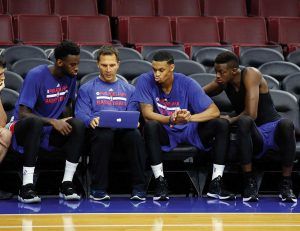
Lange works with players JaKarr Sampson, Jerami Grant and (former Sixer) K.J. McDaniels
Was becoming an NBA coach always your career plan?
When I started out, my goal was to be a college basketball coach. High school was the first stop; I needed experience and exposure. While I was at Eustace I was networking, working the summer camp circuit, just trying to get my name out there and meet the right people. I went from there to Philadelphia University, then a year at the U.S. Merchant Marine Academy, then on to Villanova for three years. Then I was hired as the head coach at the Naval Academy. I was 32, and that made me the youngest head coach in Division I basketball.
When I was at the Naval Academy I started to feel like I might want to coach at the level I’m at now. When the NBA opportunity came along, I jumped at it.
Many professional coaches started their careers as players – was that the case for you?
Growing up, my dad coached at Overbrook [High School in Pine Hill]. Like most children who grow up loving any sport, there was a point when I thought I wanted to play for the rest of my life. I think I really figured out at like 7 or 8 that wasn’t going to happen, but I still wanted to be involved with the game forever. I remember being at my dad’s high school practices and going into the locker room to give pretend pre-game speeches.
I played at Eustace and played one year of Division III at DeSales, which was then Allentown College. I transferred to Rowan and played for two years. I stopped playing my senior year. I saw the writing on the wall that my basketball career was going to end, and I began to put all my efforts toward becoming a great coach.
What are some of the biggest differences between coaching at the college and professional levels?
We’re around the players so much. In college, you only have a limited amount of time to be with them and work with them. With this team, I could coach the same two or three guys for 10 years – there’s no graduation.
It’s amazing to me to see how these players approach their jobs with such drive and professionalism. It is so much more than a game to them. It’s amazing to be able to really relate to them and to see how serious they are about their bodies and their craft.
Are there any striking similarities?
This is a very young team. A lot of them are the same age as the college players I was coaching, and I think my experience being around that age for as long as I was has been really helpful. Part of coaching in college is communicating the importance of sportsmanship and making sure your athletes are conducting themselves the right way when they’re not on the court. We have an opportunity to instill a lot of that in this team too, even though they’re pros. We talk a lot about those things, and we’ve really instilled a culture. We’re always planting small seeds of “This is how you’re supposed to live and act as a pro.”
The level of character in the NBA in general is very high. That’s something that caught me by surprise. It’s an amazing fraternity. These guys really care about each other. By and large, the NBA, just like college basketball, is made up of genuinely good people.
Speaking of South Jersey – the team is moving their headquarters to Camden. Is that a move you’re excited about?
I think it’ll be neat for Camden and neat for South Jersey. The thing that gets us fired up is we’re building a world-class facility. That’ll help us in this process for multiple reasons. And of course, the fact that it’s in an area close to where I grew up couldn’t be cooler.
You have four sons. Do they all play basketball?
I have an 11-year-old, a 10-year-old and 8-year-old twins, so there’s never a dull moment. They’re into everything, but of course they love basketball. I don’t coach their teams, but I go up to their school and run clinics. I’m getting better at drawing the line between dad and coach. I respect this about my dad – he was always my dad more than he was my coach. I didn’t understand that when I played for him, but now I do. I use the opportunity to talk to my sons more about having fun, working hard and communicating with their teammates. If I get on my kid in the gym, I’m more likely to correct him for not looking someone in the eye than I am to correct his dribble.
You’re living your childhood dream. What’s your advice for young people who want to do the same?
I’ve had a mantra ever since I was a kid. I think I even wrote it in my eighth-grade yearbook: follow your heart. We’re all wired to be passionate about something. As we get older, other things get in our way, things like debt or money or other problems. If you can, make the decision when you’re young to say, “This is what I know I’m meant to do,” and then just do it. I can’t imagine myself not doing this. My advice is that if something is on your heart at 7 or 8 years old, you owe it to yourself to go for it.

